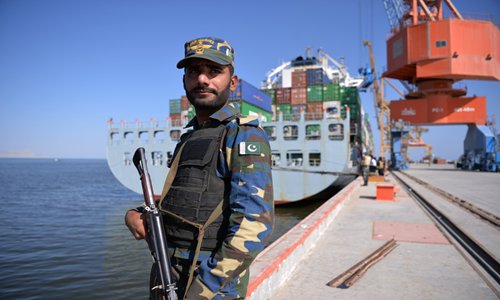
A Pakistani navy member stands guard beside a ship carrying containers during the opening of a trade project in Gwadar port, Pakistan, on November 13, 2016. (Photo: VCG)
Pakistani officials and experts have pushed back against criticisms of the China-Pakistan Economic Corridor (CPEC), describing recently raised concerns about projects under the program as "propaganda" based on false information intended to undermine the close cooperation between China and Pakistan.
As Pakistan faces a foreign exchange crisis and undergoes a political transition, CPEC, which is a flagship program of the China-proposed Belt and Road initiative, has increasingly become a main target of rising criticism by some foreign organizations and officials in recent weeks, who alleged that the projects have caused public debt and aided corruption in Pakistan.
But Pakistani officials and experts noted that infrastructure and energy projects have already brought tangible benefits to the people of Pakistan without putting extra financial burden on the Pakistani economy, and Pakistan is ready to take CPEC to the next level of industrial development.
"Obviously because of the very close relations between Pakistan and China, there are many people out there who don't like this closeness and don't like this relationship," said Pakistani Foreign Secretary Tehmina Janjua at a media briefing with Chinese reporters on Monday.
Janjua noted that the CPEC projects are not only beneficial for Pakistan economically but also socially as they will help improve people's lives.
"All the projects are basically for energy and infrastructure. How will that not help the local people?" asked Aizaz Ahmad Chaudhry, director general of the Institute of Strategic Studies in Islamabad.
"Not every country is happy about Pakistan-China cooperation, so they keep spreading negative news about [CPEC]," said Chaudhry.
Chaudhry suggested that India and the US might have been behind what he described as "propaganda" against CPEC.
"One country which has openly said that it is not happy is India," Chaudhry said, noting that India has long claimed that CPEC runs through its territory. He further noted that the US and India have moved closer to each other because of their shared interests against CPEC. "But we should not get deterred by this propaganda," he said.
Benefits with minimum debt
Shaukat Khattak, deputy director of media for CPEC at the Pakistani Ministry of Planning Development and Reforms, pointed out that since the start of the CPEC projects, Pakistan has only obtained about $6 billion in loans, which are government concessional loans with a five-year grace period before repayment of 25 years.
"So it will have, as you can see, minimum burden on the Pakistani economy… it will not have the debt burden as projected by some international organizations," Khattak told reporters on Monday, adding that the benefits from CPEC projects have already been seen at minimum cost.
Khattak further pointed out that CPEC projects have already helped significantly with power shortages in Pakistan and are estimated to create as many as one million jobs in Pakistan.
Muhammad Zubair Umar, the outgoing governor of Pakistan's Sindh Province, which covers Karachi, one of the largest and most vibrant cities in the world, said that power shortages used to be a main topic for politicians in elections, but in the recent general election, held during the sweltering summer, "not a single politician was talking about energy even once."
"We are delighted that China came to the rescue… we are far, far better in terms of the energy situation today," Umar told reporters on Tuesday in Karachi, adding that different "opinions" of CPEC's cost and other issues would remain, but the benefits "far exceed" the cost Pakistan has to pay.
In one such opinion, as Pakistan was reported to be seeking loans from the IMF amid a foreign exchange crisis, US Secretary of State Mike Pompeo on Monday said Pakistan could not use potential IMF funds to repay Chinese debts.
Khalid Mahmood, chairman of the Institute of Strategic Studies in Islamabad, said that activities boosted by CPEC projects will help Pakistan pay back its debts.
"Following the implementation of CPEC projects, from energy projects to infrastructure projects to ports, it's going to generate economic activity, and that activity will enable Pakistan to pay back its loans or to meet other financial obligations," Mahmood told reporters.


